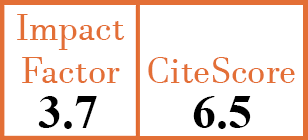Full Papers
Demographic, clinical and therapeutic findings in a monocentric cohort of adult patients with suspected PFAPA syndrome
A. Vitale1, I. Orlando2, G. Lopalco3, G. Emmi4, M. Cattalini5, B. Frediani6, M. Galeazzi7, F. Iannone8, D. Rigante9, L. Cantarini10
- Research Center of Systemic Autoinflammatory Diseases and Behçet’s Disease Clinic, Department of Medical Sciences, Surgery and Neurosciences, University of Siena, Italy.
- Research Center of Systemic Autoinflammatory Diseases and Behçet’s Disease Clinic, Department of Medical Sciences, Surgery and Neurosciences, University of Siena, Italy.
- Interdisciplinary Department of Medicine, Rheumatology Unit, University of Bari Aldo Moro, Bari, Italy.
- Department of Experimental and Clinical Medicine, University of Florence, Italy.
- Paediatric Clinic, University of Brescia and Spedali Civili di Brescia, Italy.
- Research Center of Systemic Autoinflammatory Diseases and Behçet’s Disease Clinic, Department of Medical Sciences, Surgery and Neurosciences, University of Siena, Italy.
- Research Center of Systemic Autoinflammatory Diseases and Behçet’s Disease Clinic, Department of Medical Sciences, Surgery and Neurosciences, University of Siena, Italy.
- Interdisciplinary Department of Medicine, Rheumatology Unit, University of Bari Aldo Moro, Bari, Italy.
- Institute of Paediatrics, Università Cattolica Sacro Cuore, Fondazione Policlinico Universitario “A. Gemelli”, Rome, Italy.
- Research Center of Systemic Autoinflammatory Diseases and Behçet’s Disease Clinic, Department of Medical Sciences, Surgery and Neurosciences, University of Siena, Italy. cantariniluca@hotmail.com
CER9204
2016 Vol.34, N°6 ,Suppl.102
PI 0077, PF 0081
Full Papers
Free to view
(click on article PDF icon to read the article)
PMID: 27791949 [PubMed]
Received: 19/12/2015
Accepted : 01/06/2016
In Press: 25/10/2016
Published: 25/10/2016
Abstract
OBJECTIVES:
Periodic fever, aphthous stomatitis, pharyngitis, and cervical adenopathy (PFAPA) syndrome is a non-Mendelian autoinflammatory disorder until now considered to be specifically limited to paediatric age. Recently, an increasing number of reports seems to suggest that PFAPA syndrome, diagnosed by the Marshall criteria revised by Thomas et al., can also affect adults.
METHODS:
The Marshall/Thomas criteria have been applied to 989 adult patients presenting for recurrent fever episodes: all patients enrolled were reviewed for demographic, clinical, and therapeutic data. Infectious, neoplastic, autoimmune and other autoinflammatory diseases were ruled out.
RESULTS:
We identified 30 adult patients (19 males, 11 females) with a suspected PFAPA syndrome: their mean age at disease onset was 33.75±14.01 years, mean age at diagnosis 39.1±14.39 years, and mean body temperature peak 39.5±0.7°C. In addition, the mean frequency of febrile episodes was 11.58±8.97 per year. More precisely, patients complained of pharyngitis (77%), cervical adenitis (73%), asthenia (63%), arthralgia (67%), oral aphthosis (50%), myalgia (54%), cephalalgia (43%), abdominal pain (27%), nausea/vomiting (17%), periorbital pain (17%), and arthritis (10%). Six out of 30 (20%) patients had suffered from PFAPA syndrome also during childhood, and the disease had reappeared in adulthood.
CONCLUSIONS:
We provide the largest monocentric cohort of patients diagnosed with a suspected PFAPA syndrome in adulthood confirming that this syndrome can occur also during adulthood; moreover, due to the medical history of our patients and based on our experience, PFAPA syndrome might relapse during adulthood after a temporary remission reached in the course of paediatric age.


